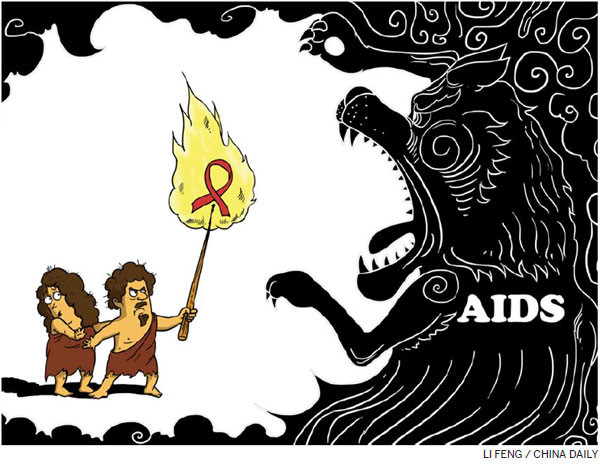Ending AIDS is not an unreachable goal
Updated: 2015-12-04 08:22
By Catherine Sozi and Bernard Schwartlander(China Daily Europe)
|
|||||||||||
China needs to provide adequate services to gay men, who represent rising proportion of new infections
In the not-so-distant future, it is plausible that AIDS could be something we read about in history books rather than newspaper headlines. Last September, China, along with other member states gathered at the United Nations, adopted the Sustainable Development Goals and committed to ending AIDS as a public health threat by 2030. On this World AIDS Day, the UN is calling on the international community to start delivering on this promise.
We know that China can achieve incredible things when it sets its mind to a challenge - as demonstrated by the fact that an astonishing 660 million people were lifted out of poverty in the last generation. The same spirit of determination, pragmatism and optimism that led to such an extraordinary achievement now needs to be embraced to end the AIDS epidemic. While its overall infection rates remain low, China remains in the top 15 countries worldwide for the total number of people living with HIV, and for new infections. The virus keeps spreading - and it is time to stop it in its tracks.

We know what needs to be done: social attitudes and support for the communities most affected by HIV need to change, so that these communities are better equipped to protect themselves; and have better access to testing and early treatment if they are living with HIV. In the case of China, this means doing more to support men who have sex with men.
While overall the number of new infections has been rather stable in China, and the vast majority of new infections remain heterosexual, homosexual transmission has increased from 2.5 percent in 2006 to almost 26 percent among all cases this year. This is not just an issue in China: in Asia, men who have sex with men are 19 times more likely to be living with HIV than the general population. We must tackle the stigma and discrimination that stops these men from getting tested early and getting into treatment.
Men who have sex with men are already stigmatized, and they face a double burden of stigma when they are living with HIV - making it difficult for them to access available services. But overall, services for this key population remain under-resourced and of insufficient scale.
While homosexuality was decriminalized in China in 1997 and officially removed from the list of mental illnesses in 2001, there has been little progress on the social environment for sexual minorities. In China, the majority of homosexual individuals and couples remain invisible. There are no laws to protect sexual and gender minorities from discrimination.
We need a pragmatic response. First, we must ensure that stigma-free services are delivered when and where they are needed. This could be achieved simply through more support for community-based organizations: services by the gay community for the gay community are likely to be more effective in meeting that community's needs, as many examples around the world have shown.
Second, we need to ensure that the HIV services offered are those which will be most effective - for instance, single-dose combination of drugs and community-led rapid testing. These approaches are standard elsewhere in the world - and there's no reason why they couldn't be introduced in China. If they were, testing rates and uptake of and adherence to treatment would improve dramatically.
China's recent commitment to ending AIDS by 2030 is laudable - but achieving it will only be possible if science is accompanied by a commitment to respecting human dignity and embracing marginalized people. With single-minded focus on ensuring that the necessary information and services reach those who need them most, we can ensure that ending AIDS by 2030 is not an unreachable goal.
Catherine Sozi is UNAIDS country director and Bernard Schwartlander is WHO representative in China, on behalf of the UN Country Team on AIDS. The views do not necessarily reflect those of China Daily.
(China Daily European Weekly 12/04/2015 page11)
Today's Top News
Xi in South Africa to boost China-Africa cooperation
SOEs face headwinds as 21% witness profits decline
President Xi arrives at South Africa for state visit
China ready for risks after yuan included in SDR
Premier League coaches to aid China's soccer goal
Chinese companies invest in City Football Group
Investment expected as Xi arrives in Zimbabwe
Xi's Zimbabwe visit to elevate bilateral ties to new high
Hot Topics
Lunar probe , China growth forecasts, Emission rules get tougher, China seen through 'colored lens', International board,
Editor's Picks

|

|

|

|

|

|






